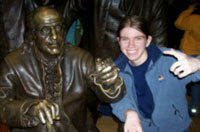BROWSE BY CATEGORY
- Archives and Libraries
- Blogs and Networking
- Bookmark This
- Digital Tools
- Examples of Teaching
- Exhibits
- Film Reviews
- History and Headlines
- Historic Sites and Museums
- Historical Thinking
- Holidays and Heritage
- Issues and Research
- Lesson Plans
- Material and Visual Culture
- Multimedia
- Organizations and Agencies
- Primary Sources
- Professional Development
- Publications
- Student Activities
- Teaching Materials
- Websites
National History Club: Having Fun AND Doing History

They take field trips, organize historic preservation activities, work together on National History Day projects, create films, develop local history projects, interview contemporary people of prominence, write scholarly papers (helpful for college admissions, among other things)—in fact there's almost no political, artistic, social, economic, military, athletic, scientific, cultural, religious, technological, literary, philosophical, geographic, ethnic, and mathematical topic they leave unexplored.
And they are involved in their communities, learning critical thinking and communication skills and practicing responsible and effective citizenship and leadership.
THEY are the more than 10,000 members of 375 middle school and high school chapters of the National History Club found in 43 states. The National History Club was founded in 2002 by The Concord Review Inc. (TCR), which publishes the only scholarly review of history essays written by secondary students.
Last spring, New Jersey students participated in a Junior Historians Forum on World War II at the Gilder Lehrman Institute, reading primary source documents and meeting with university professors. In San Francisco, field trips included a guided tour of Alcatraz Island. In Missouri, museum trips led to a focus on George Washington Carver, Dred Scott, and women's history.
Would a chapter of the National History Club benefit your school? Read about How to Start a History Club Chapter, follow links to newsletters describing the activities of individual clubs, or look for nearby chapters for collaborative possibilities.